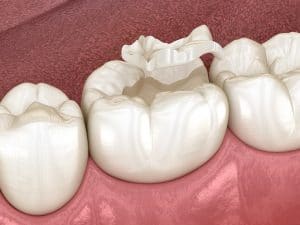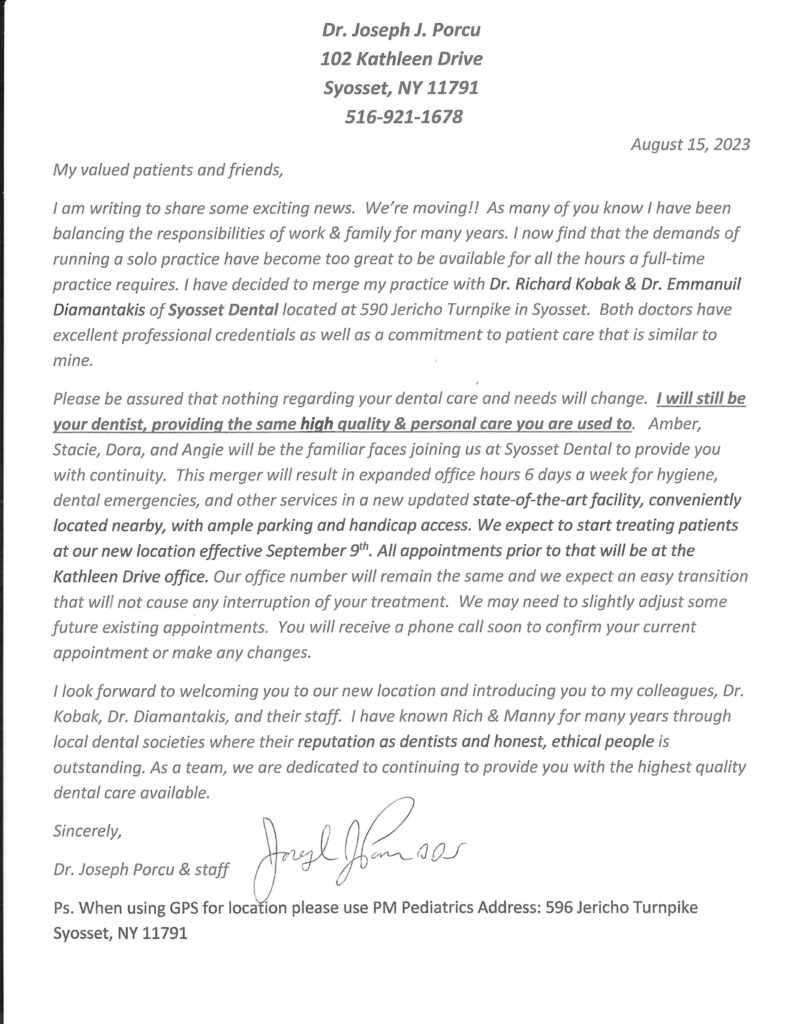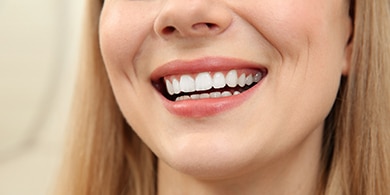 A healthy and disease-free smile is something you should be proud of, but if your smile’s appearance isn’t as optimal as its health, then it can still negatively impact your confidence. Cosmetic dentistry involves several highly customizable solutions to improving your smile’s appearance, often with a focus on keeping your treatment plan as minimally invasive as possible. If your teeth are stained, chipped, misshapen, slightly uneven, or more, then learn how the right cosmetic dental procedure can help create the smile you want. (more…)
A healthy and disease-free smile is something you should be proud of, but if your smile’s appearance isn’t as optimal as its health, then it can still negatively impact your confidence. Cosmetic dentistry involves several highly customizable solutions to improving your smile’s appearance, often with a focus on keeping your treatment plan as minimally invasive as possible. If your teeth are stained, chipped, misshapen, slightly uneven, or more, then learn how the right cosmetic dental procedure can help create the smile you want. (more…)
How to Properly Deal with a Cracked Tooth
 There are a lot of reasons why a tooth could crack, and in some cases, it might not hurt immediately enough for you to notice. However, even if you don’t realize it, the damage to your tooth can become an increasingly bigger threat to your oral health the longer it’s left untreated. Fortunately, you don’t have to suffer a cracked tooth for long. With timely restorative treatment, your dentist can fix your tooth, alleviate the discomfort of its fracture, and restore its health and structural integrity. (more…)
There are a lot of reasons why a tooth could crack, and in some cases, it might not hurt immediately enough for you to notice. However, even if you don’t realize it, the damage to your tooth can become an increasingly bigger threat to your oral health the longer it’s left untreated. Fortunately, you don’t have to suffer a cracked tooth for long. With timely restorative treatment, your dentist can fix your tooth, alleviate the discomfort of its fracture, and restore its health and structural integrity. (more…)
The Less Visible Benefits of Tooth-Colored Fillings
 Dealing with cavities isn’t necessarily tricky, but it can mean different things depending on several specific factors. For example, you can prevent cavities from ever developing with consistently good hygiene and preventive care. Or, you can detect and treat one before it even becomes obvious by detecting it early with advanced DIAGNOdent imaging. If a cavity develops and has time to grow more serious, then you may be able to stop it and restore your tooth with a tooth-colored filling. Using customizable composite resin that blends in discreetly with your tooth, we can create a filling that not only offers a more esthetic restoration, but also benefits your oral health in several other important ways. (more…)
Dealing with cavities isn’t necessarily tricky, but it can mean different things depending on several specific factors. For example, you can prevent cavities from ever developing with consistently good hygiene and preventive care. Or, you can detect and treat one before it even becomes obvious by detecting it early with advanced DIAGNOdent imaging. If a cavity develops and has time to grow more serious, then you may be able to stop it and restore your tooth with a tooth-colored filling. Using customizable composite resin that blends in discreetly with your tooth, we can create a filling that not only offers a more esthetic restoration, but also benefits your oral health in several other important ways. (more…)
What Actually Causes TMJ Disorder?
 When you practice consistently good hygiene and keep up with regular preventive dental visits, you have a very good chance of preventing some of the most common dental health concerns. Things like tooth decay, gum disease, and chronic bad breath can all stem from excessive plaque and tartar buildup. However, not every challenge that your smile faces can be controlled with good hygiene. For example, if your jaw’s joints can’t operate properly – a condition known as TMJ disorder – then you may require more than just a dental checkup and cleaning to resolve it. (more…)
When you practice consistently good hygiene and keep up with regular preventive dental visits, you have a very good chance of preventing some of the most common dental health concerns. Things like tooth decay, gum disease, and chronic bad breath can all stem from excessive plaque and tartar buildup. However, not every challenge that your smile faces can be controlled with good hygiene. For example, if your jaw’s joints can’t operate properly – a condition known as TMJ disorder – then you may require more than just a dental checkup and cleaning to resolve it. (more…)
Teeth-Whitening: Professional vs. OTC Treatments
 Few good things could be said about teeth stains, but one of the most important ones is that they can often be erased quickly and conveniently with teeth-whitening treatment. Because common teeth stains are often cosmetic and don’t pose a threat to your oral health, you can even find multiple over-the-counter (OTC) products that promise to effectively whiten your teeth. Such options are tempting given their convenience; however, even if your teeth stains are minor, treating them professionally is almost always the best option. (more…)
Few good things could be said about teeth stains, but one of the most important ones is that they can often be erased quickly and conveniently with teeth-whitening treatment. Because common teeth stains are often cosmetic and don’t pose a threat to your oral health, you can even find multiple over-the-counter (OTC) products that promise to effectively whiten your teeth. Such options are tempting given their convenience; however, even if your teeth stains are minor, treating them professionally is almost always the best option. (more…)
What No One Tells You About Bad Breath
 Some people have no problem telling you that your breath is bad, while others may try to drop hints so as not to cause you any embarrassment. Some people may offer a few friendly tips, like chewing gum, and others may never say anything, but limit their interactions with you to avoid having to deal with it. However, what no one but your dentist can tell you about your bad breath is why it’s bad, and what options you have for actually getting rid of it. (more…)
Some people have no problem telling you that your breath is bad, while others may try to drop hints so as not to cause you any embarrassment. Some people may offer a few friendly tips, like chewing gum, and others may never say anything, but limit their interactions with you to avoid having to deal with it. However, what no one but your dentist can tell you about your bad breath is why it’s bad, and what options you have for actually getting rid of it. (more…)
Reasons Why Oral-Systemic Health Should Matter to You
 Your oral health consists of many different aspects. For example, dental and periodontal care encompass most treatments that address the health of your teeth and gums. Your oral health is also closely related to your overall systemic wellbeing in many different ways. For instance, if you have severe gum disease, it could have a significant influence on your risks of other chronic inflammatory diseases. If you have a sleep breathing disorder, like sleep apnea, that involves oral tissues clogging your airway, then it could negatively impact your cardiovascular and other systems over time. Today, we examine a few aspects of the oral-systemic connection, and how understanding it can help you improve your quality of life. (more…)
Your oral health consists of many different aspects. For example, dental and periodontal care encompass most treatments that address the health of your teeth and gums. Your oral health is also closely related to your overall systemic wellbeing in many different ways. For instance, if you have severe gum disease, it could have a significant influence on your risks of other chronic inflammatory diseases. If you have a sleep breathing disorder, like sleep apnea, that involves oral tissues clogging your airway, then it could negatively impact your cardiovascular and other systems over time. Today, we examine a few aspects of the oral-systemic connection, and how understanding it can help you improve your quality of life. (more…)
A Few Other Things Sleep Apnea Treatment Improves
 When you have obstructive sleep apnea – a disorder that causes you to stop breathing in your sleep – there are several different ways in which it can affect your sleep and your life. For instance, sleep apnea stops you from entering deep levels of sleep, such as Rapid Eye Movement (R.E.M.), which can cause you to grow increasingly more sleep deprived. By treating sleep apnea, preferably with a custom-designed oral appliance, you can alleviate the cause behind your sleep apnea so you can rest peacefully each night. As you sleep more soundly, you’ll also notice several related benefits of finally treating your sleep apnea. (more…)
When you have obstructive sleep apnea – a disorder that causes you to stop breathing in your sleep – there are several different ways in which it can affect your sleep and your life. For instance, sleep apnea stops you from entering deep levels of sleep, such as Rapid Eye Movement (R.E.M.), which can cause you to grow increasingly more sleep deprived. By treating sleep apnea, preferably with a custom-designed oral appliance, you can alleviate the cause behind your sleep apnea so you can rest peacefully each night. As you sleep more soundly, you’ll also notice several related benefits of finally treating your sleep apnea. (more…)
When Smile Improvement Requires Full Reconstruction
 If you have multiple concerns with your smile, then it isn’t advisable to just focus on one and ignore the rest. For example, if you have one tooth that’s chipped or fractured, another that’s infected with decay, and several more that are out of alignment, then each issue could be equally threatening to your overall oral health. A custom-designed full-mouth rehabilitation plan is one that takes all of your smile’s concerns into account, and focuses on improving your smile’s overall health, bite function, and appearance in a conservative matter. (more…)
If you have multiple concerns with your smile, then it isn’t advisable to just focus on one and ignore the rest. For example, if you have one tooth that’s chipped or fractured, another that’s infected with decay, and several more that are out of alignment, then each issue could be equally threatening to your overall oral health. A custom-designed full-mouth rehabilitation plan is one that takes all of your smile’s concerns into account, and focuses on improving your smile’s overall health, bite function, and appearance in a conservative matter. (more…)
Does Your Tooth Need a Full or Partial Crown?
 When a tooth is cosmetically blemished, structurally damaged, or made slightly weaker by root canal therapy, a dental crown is often the most appropriate restoration for it. A custom-made crown can completely cap the tooth in question, revitalizing its appearance as well as fortifying and strengthening its healthy, natural structure. Today, however, not every dental crown caps a tooth completely. For minor cases of tooth damage or cosmetic blemishing, we may recommend a partial dental crown to address your tooth’s concern while minimizing the amount of preparation needed to restore it. (more…)
When a tooth is cosmetically blemished, structurally damaged, or made slightly weaker by root canal therapy, a dental crown is often the most appropriate restoration for it. A custom-made crown can completely cap the tooth in question, revitalizing its appearance as well as fortifying and strengthening its healthy, natural structure. Today, however, not every dental crown caps a tooth completely. For minor cases of tooth damage or cosmetic blemishing, we may recommend a partial dental crown to address your tooth’s concern while minimizing the amount of preparation needed to restore it. (more…)











